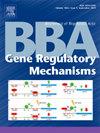泛素化、蛋白质降解和人类疾病中的长非编码 RNA。
IF 3.1
3区 生物学
Q3 BIOCHEMISTRY & MOLECULAR BIOLOGY
Biochimica et Biophysica Acta-Gene Regulatory Mechanisms
Pub Date : 2024-09-26
DOI:10.1016/j.bbagrm.2024.195061
引用次数: 0
摘要
蛋白质的稳定性和周转在正常的细胞和生理过程中至关重要,它们的失调可能会导致不需要的蛋白质的积累,从而引起细胞功能失调、神经变性、线粒体功能失常和新陈代谢紊乱。与蛋白质降解相关的信号机制十分复杂,研究也很广泛。许多蛋白质和酶机制都与蛋白质降解的调控有关。尽管有这些见解,我们对蛋白质降解机制的了解仍然有限。新的研究表明,长非编码 RNA(lncRNA)在新陈代谢、细胞稳态和蛋白质周转等各种细胞和生理过程中发挥着关键作用。LncRNA 是一种大核酸(>200 nt 长),可与各种蛋白质和其他核酸相互作用,调节蛋白质的结构和功能,从而调节细胞信号传导过程。LncRNAs 广泛分布于各种细胞类型,并可能表现出组织特异性表达。它们可在血液和尿液等体液中检测到。在癌症、神经系统疾病、免疫紊乱等各种人类疾病中,它们的表达也会发生改变。LncRNA 被认为是新型生物标记物和治疗靶标。这篇综述文章重点探讨了非编码 RNA(ncRNA),尤其是长非编码 RNA(lncRNA)在调控蛋白质多泛素化和蛋白酶体降解中的新作用。本文章由计算机程序翻译,如有差异,请以英文原文为准。
Long noncoding RNAs in ubiquitination, protein degradation, and human diseases
Protein stability and turnover is critical in normal cellular and physiological process and their misregulation may contribute to accumulation of unwanted proteins causing cellular malfunction, neurodegeneration, mitochondrial malfunction, and disrupted metabolism. Signaling mechanism associated with protein degradation is complex and is extensively studied. Many protein and enzyme machineries have been implicated in regulation of protein degradation. Despite these insights, our understanding of protein degradation mechanisms remains limited. Emerging studies suggest that long non-coding RNAs (lncRNAs) play critical roles in various cellular and physiological processes including metabolism, cellular homeostasis, and protein turnover. LncRNAs, being large nucleic acids (>200 nt long) can interact with various proteins and other nucleic acids and modulate protein structure and function leading to regulation of cell signaling processes. LncRNAs are widely distributed across cell types and may exhibit tissue specific expression. They are detected in body fluids including blood and urine. Their expressions are also altered in various human diseases including cancer, neurological disorders, immune disorder, and others. LncRNAs are being recognized as novel biomarkers and therapeutic targets. This review article focuses on the emerging role of noncoding RNAs (ncRNAs), particularly long noncoding RNAs (lncRNAs), in the regulation of protein polyubiquitination and proteasomal degradation.
求助全文
通过发布文献求助,成功后即可免费获取论文全文。
去求助
来源期刊
CiteScore
9.20
自引率
2.10%
发文量
63
审稿时长
44 days
期刊介绍:
BBA Gene Regulatory Mechanisms includes reports that describe novel insights into mechanisms of transcriptional, post-transcriptional and translational gene regulation. Special emphasis is placed on papers that identify epigenetic mechanisms of gene regulation, including chromatin, modification, and remodeling. This section also encompasses mechanistic studies of regulatory proteins and protein complexes; regulatory or mechanistic aspects of RNA processing; regulation of expression by small RNAs; genomic analysis of gene expression patterns; and modeling of gene regulatory pathways. Papers describing gene promoters, enhancers, silencers or other regulatory DNA regions must incorporate significant functions studies.

 求助内容:
求助内容: 应助结果提醒方式:
应助结果提醒方式:


